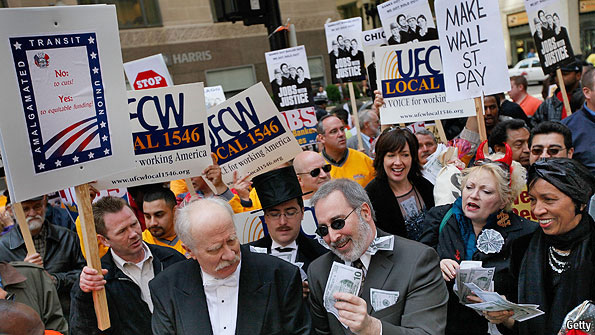Do outside directors leave just as companies need them most?
Business-school research
May 4th 2010

RUTH SIMMONS joined Goldman Sachs's board as an outside director in January 2000; a year later she became president of Brown University in Rhode Island. For the rest of the decade she apparently juggled both roles (as well as several other directorships) without attracting much criticism. But by the end of 2009 Ms Simmons was under fire from students and alumni for having sat on Goldman's compensation committee; how could she have let those enormous bonus payouts pass unremarked? By February Ms Simmons had left the board. The position was just taking up too much time, she said.
Ms Simmons's decision to leave makes perfect sense, according to research conducted by Rüdiger Fahlenbrach at the École Polytechnique Féderale in Lausanne, Angie Low of Nanyang Technological University in Singapore, and René Stulz of The Ohio State University. The three are co-authors of a new working paper suggesting that when trouble looms for a firm, outside directors have more incentives to quit than to stay.
Outside directors are supposed to serve as helpful, yet less biased, advisers on a firm's board. Having made their wealth and their reputations elsewhere, they presumably have enough independence to disagree with the chief executive's proposals. Leaders from other fields are frequently in demand: former presidents or Cabinet members, retired CEOs, and yes, university presidents. If the sky, and the share price, is falling, outside directors should be able to give advice based on having weathered their own crises.
The researchers used a database that covered more than 10,000 firms and more than 64,000 different directors between 1989 and 2004. Then they simply checked which directors stayed from one proxy statement to the next. The most likely reason for departing a board was age, so the researchers concentrated on those "surprise" disappearances by directors under the age of 70. They found that after a surprise departure, the probability that the company will subsequently have to restate earnings increases by nearly 20%. The likelihood of being named in a federal class-action lawsuit also increases, and the stock is likely to perform worse. The effect tended to be larger for larger firms, reported Dr Fahlenbrach.
Bail out before the bail-out
The obvious conclusion might be that outside directors, with inside knowledge of tricky times ahead, prefer to save their own reputations, rather than those of the company they are serving. But although a correlation between them leaving and subsequent bad performance at the firm is suggestive, it does not mean that such directors are always jumping off a sinking ship. Often they "trade up", leaving riskier, smaller firms for larger and more stable firms.
But the researchers believe that outside directors have an easier time of avoiding a blow to their reputations if they leave a firm before bad news breaks, even if a review of history shows they were on the board at the time any wrongdoing occurred. Firms who want to keep their outside directors through tough times may have to create incentives, such as increasing pay, says Dr Fahlenbrach. Otherwise outside directors will follow the example of Ms Simmons, once again very popular on campus.
